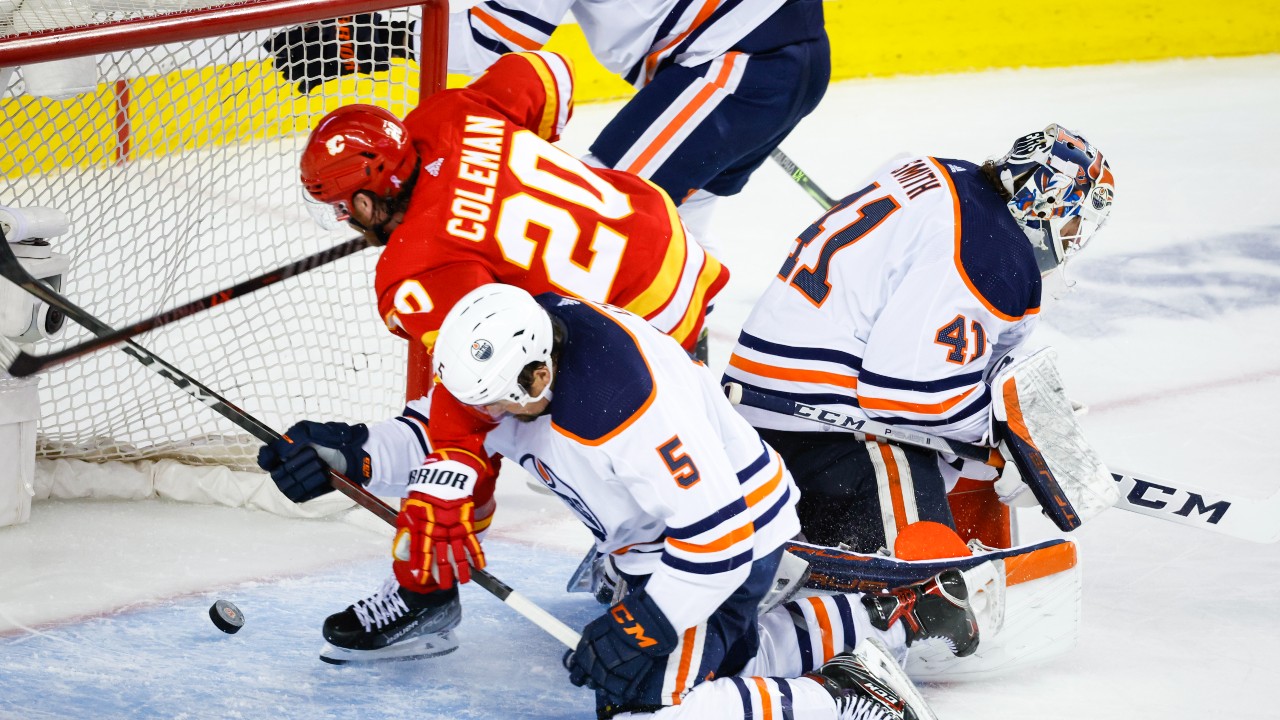
CALGARY — This time, the debate isn’t whether the puck crossed the goal line.
It’s how the league said it got there that has Calgary Flames fans, and a good portion of the hockey world, angry and confused.
The league said it was “distinctly” kicked in.
And it cost the Flames their season.
With 5:57 left in a fantastic 4-4 game on Thursday, Mikael Backlund made a brilliant move around Darnell Nurse to get a shot on Mike Smith that squeezed through the Edmonton Oilers netminder and was trickling towards the net.
Just before it crossed the line, the left skate blade of Blake Coleman pushed it in as he was attempting to stop while falling in a battle with Cody Ceci.
The Saddledome erupted, only to have the celebration marred by a league-initiated review that deemed Coleman used a “distinct kicking motion.”
The crowd was stunned, as was most of the hockey world.

“Well, depends what you call a distinct kicking motion,” shrugged an unimpressed Darryl Sutter, whose team went on to lose 5-4 in overtime.
“If somebody is on the ground and you lift your foot up, kick ’em in the head, that’s a distinct kicking motion. If you slide your foot on the ground, it’s not a distinct kicking motion.”
There’s little question Coleman opened his blade towards the puck, which is legal.
Pretty tough to distinctly kick something while using that same foot to stop, especially at that speed, and with a defender hauling you down.
“There’s no intent — just trying to get there,” said Coleman, taking a long pause before answering whether he agreed with a call on a rule he said he must not understand.
“I opened my foot, but my understanding is that you can redirect the puck as long as you’re not lifting it and kicking it in the net.
“Getting pushed, trying to keep my foot on the ice … I haven’t watched it enough, but in live speed I felt like I was in a battle.
“I didn’t feel like I kicked it, but you can’t go back and change it now.
“It’s unfortunate that was such a big part of the game and influenced the way it all went down.”

The fury in Calgary won’t subside anytime soon, as this isn’t the first time the team’s been victimized like this.
It was 18 years ago Martin Gelinas’ potential Cup-clinching goal with seven minutes left in Game 6 of the 2004 Stanley Cup Final didn’t count despite appearing to cross the line.
The puck bounced in off Gelinas’ right skate as he too stopped while driving the net.
It happened in the very same net that Coleman also appeared to score in.
It simply wasn’t reviewed that night, as league officials weren’t made aware of the goal in time for a review, nor were there enough camera angles to properly deem it a goal anyway.
The irony is that moments like those led to the improved technology and approach that prompted the league to overrule the call on the ice Thursday.
This time it was simply a judgment call.
The shame of it all is that the puck would have crossed the line anyway, had Coleman not touched it.
An even bigger shame is that an epic series like this had a call like that — one that played such a huge role in the final outcome.
A series that featured a 15-goal classic, a 132-foot snipe, four goals in 71 seconds, more lead changes than a horse race and record-setting brilliance from Connor McDavid and Leon Draisaitl will be remembered in Calgary for The Goal That Got Disallowed.

“Yeah, it would have been great if it counted,” said Backlund, whose club surrendered a 2-0 lead for the third time in the series.
“There’s five minutes left, so who knows what would have happened after.
“It’s hard, but I don’t think we lost the series today. I thought Game 2 and 3 got away from us. Even Game 1, we’re up 6-2. We should kill their first game right there, don’t give their big guns any free confidence.”
Sutter chose not to dwell on the controversy, summing up the season well.
“Get your chin up and your chest out and walk out proud,” was his message to the players.
“They did a hell of a lot more than anybody said they’d do, quite honest. I mean, the team that beat us was a favourite coming into the year, and we weren’t even close. So, did a good job. I’m sure they’re disappointed but that’s this division against those guys.”
Make no mistake, the better team won the series.
Or, as Sutter put it, “the best player won the series.”
Had McDavid not buried the winner five minutes into overtime, he almost certainly would have found another way to break the hearts of Flames fans.
Instead, the heartbreak stemmed from the type of call no one wants a game decided on.






